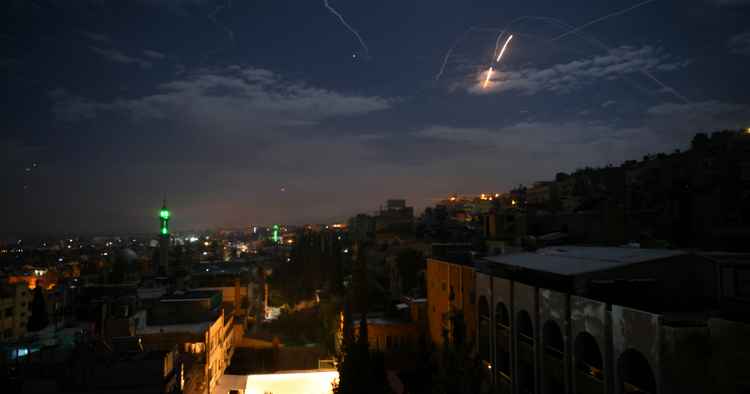In recent years, Israel has waged a campaign against the military buildup of its enemies, mainly Iran, Syria, and Hezbollah. This ongoing effort is called "the campaign between the wars,” or the Mabam Campaign.
Several events in recent weeks have given rise to questions about the effectiveness of this campaign, however, and have underscored the need to rethink its future. Among these is an interview with Maj. Gen. Tal Kalman, who admitted that despite Israel's efforts,
Increasing complexity
There are a number of factors contributing to the increasing complexity of the operational and political risks of carrying out military attacks, including:
- Iran and Hezbollah are trying to find
creative ways to bypass the challenges posed by the campaign between the wars. For example, at the beginning Hezbollah made attempts to smuggle entire precision-guided missiles from Iran through Syria to Lebanon, but many of these operations were thwarted. As a result, in 2016 the organization decided not to deliver any more complete missiles, instead smuggling the precision components into Lebanon and installing them on inaccurate missiles it already possessed. - Israel is reluctant to harm Hezbollah’s operatives in Syria because doing so would violate Hezbollah's"rules of the game" and prompt it to respond against Israel’s northern border.
- Iran’s soft power approach in Syria, which includes the establishment of schools, a religious and learning center, and universities, has deepened its grip on the country and casts doubt on Israel's ability to drive it out with airstrikes.
- Bashar al-Assad is being welcomed back into the "family of nations," thereby strengthening his legitimacy.
- The Russian challenge in Syria is intensifying, presenting Israel with various political difficulties that make it harder to carry out enough airstrikes against Hezbollah and
Islamic Revolutionary Guard Corps (IRGC) Quds Force officials, for fear of escalating tensions with Russia. - Israeli is reluctant to act in Lebanon, as any such action would lead to escalation on the northern front.As a result, most of the campaign between the wars is concentrated in Syria.
- Syrian military activity in the face of Israeli airstrikes, with an emphasis on firing SAMs such as the SA-5, can threaten civilian aircraft and even Israeli citizens.
These and other challenges illustrate that despite Israel’s relative success in delaying the buildup ofHezbollah, at the end of the day, Iran and its ally in Lebanon have built strategic capabilities in Syria and Lebanon (including precision-guided missiles). Moreover, the delay in the military buildup was not accompanied by any political or strategic move to exploit it. At present, Hezbollah and Iran are taking full advantage of the challenges facing Israel, and the Iranian military buildup is at its peak, including in Syria, Lebanon, Iraq, and Yemen.
As Israel’s campaign, in its current form, is failing to stop the Iranian buildup and may even embroil it in a conflict on its northern border that could cause an unprecedented crisis with Moscow, it should consider adopting a different policy moving forward.
There are clear limits to what Israel can accomplish through military action alone. It should instead adopt a broader approach that includes other policy actions.
Punish the Syrian regime for its partnership with Iran and Hezbollah, especially those who are turning a blind eye or allowing Hezbollah to do what it wants in Syria; this would limit the organization's ability to enrich itself. - Target Hezbollah and the IRGC Quds Force in Syria, including their operatives involved in the logistical infrastructure who enable Iran's entrenchment in the country, with an emphasis on the Golan Heights and areas near the strategic assets of the Syrian Army.
- Step up political activities around the Syrian issue. As part of these efforts, Israel should agree to a Russian proposal for a meaningful dialogue with Moscow and Washington, with the aim of limiting Iranian activity in Syria and pressuring Assad.
- Work with the U.S. administration against the growing international trend to legitimize Assad. As long as he remains in his power, the chances of expelling Hezbollah and Iran from Syria are slim. Therefore, any support for Assad is equivalent to turning a blind eye to the Iranian and Hezbollah presence in Syria.
It is important to note that stepping up Israeli operations in Syria to thwart Iranian or Syrian activities may destabilize the situation on the northern border to the point that it could lead to war with Hezbollah or Iran.
In the final analysis, the campaign between the wars seems to have reached an impasse. Israeli operations can delay Iranian entrenchment in Syria, but they cannot prevent it, so it is time to return to the drawing board to develop a more effective strategy that addresses the military and political complexities of the situation.
Danny (Dennis) Citrinowicz is a senior fellow at the Institute of Policy and Strategy (IPS) at Reichman University. Danny previously served as the head of the Iran branch in the Research and Analysis Division (RAD) in the Israeli defense intelligence and as the division's representative in the United States. The views expressed in this piece are his own.
Photo by STR/AFP via Getty Images
The Middle East Institute (MEI) is an independent, non-partisan, non-for-profit, educational organization. It does not engage in advocacy and its scholars’ opinions are their own. MEI welcomes financial donations, but retains sole editorial control over its work and its publications reflect only the authors’ views. For a listing of MEI donors, please click here.













